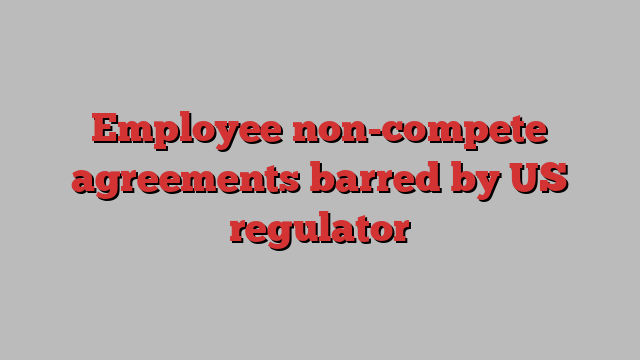
Unlock the Editor’s Digest for free
Roula Khalaf, Editor of the FT, selects her favourite stories in this weekly newsletter.
The US Federal Trade Commission has voted to ban non-compete agreements, taking aim at contracts that limit employees’ freedom to quit for a new job at a different employer.
The regulator’s commissioners voted 3-2 on Tuesday to implement the far-reaching measure first proposed in January 2023 in a bid to avoid wage suppression and protect innovation. But the move sparked immediate legal pushback.
Non-compete agreements have become pervasive across industries, amid limited oversight and a decline in unionisation, experts say. The FTC said approximately 30mn workers are subject to such contracts, which prohibit employees from working for a competitor or setting up a competing business for a period of time or within a geographical area after they leave a job.
“Non-compete clauses keep wages low, suppress new ideas, and rob the American economy of dynamism, including from the more than 8,500 new start-ups that would be created a year once non-competes are banned,” said Lina Khan, FTC chair. Non-competes constituted “unfair methods of competition”, she added.
The FTC estimated the new rule will raise an average worker’s earnings by $524 a year. The agency received more than 26,000 public comments on the matter, a sign of its importance to workers and their employers.
But the measure also inflamed industry groups that have claimed it is too drastic and will increase costs while putting trade secrets in jeopardy.
The US Chamber of Commerce announced it would sue the regulator, arguing the agency lacked constitutional and statutory authority to enact the rule, calling it a “blatant power grab” that “sets a dangerous precedent for government micromanagement of business”.
The FTC declined to comment on the chamber’s move.
Andrew Ferguson, one of two Republican FTC commissioners who voted against the rule, agreed with the argument that the agency lacked congressional authority to adopt the rule.
The expected lawsuit will compound the legal sparring between corporate America and regulators appointed by President Joe Biden who have ushered in tougher stances on rulemaking and enforcement.
Khan is among a new generation of progressive officials who have adopted more stringent antitrust policies in an effort to fight what they argue has been unchecked anti-competitive conduct.
The impending litigation is also set to add uncertainty for businesses, some lawyers said.
“The question is: what are companies supposed to do now?” said Russell Beck, an attorney who sat on a working group tackling the noncompete issue during the Obama administration.
He said the best course of action for companies was to wait and see how the issue plays out in court. “I think there will be a slew of challenges until a judge issues a nationwide injunction prohibiting the operation of the rule.”
But Rachel Dempsey, an attorney at Towards Justice, a non-profit law firm representing employees, said in a statement that non-compete agreements “keep workers trapped at jobs with low wages and poor working conditions”.
The rule was “a historic step towards protecting workers from employer abuse and empowering them to stand up for their basic rights in the workplace”, she added.